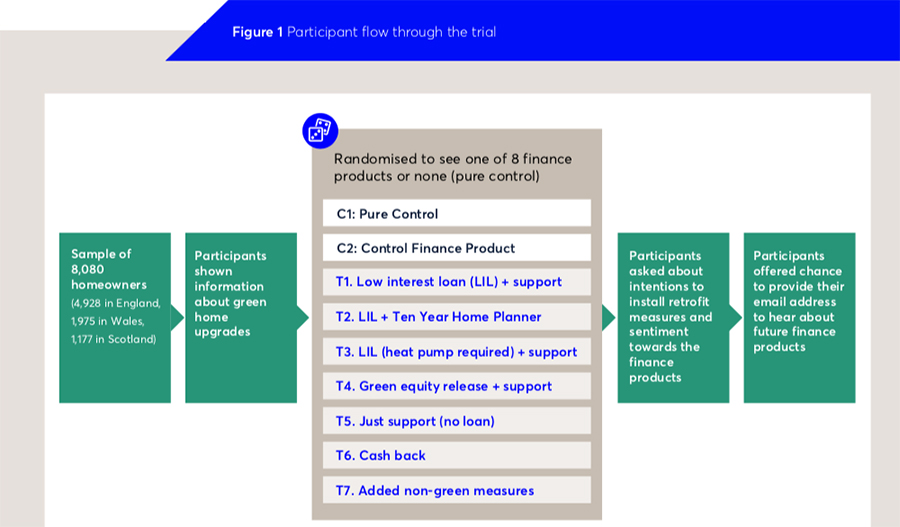Nesta report on financing green home upgrades
Contents |
[edit] All the things I could do: financing green home upgrades
In May 2023, Nesta published their latest report. A compelling and timely report reacting to research that shows "owner-occupiers want green finance to help fund green upgrades to their home. They want it to offset the high upfront cost of doing something they feel they should do, but don’t have a compelling reason to any time soon."
The report provided insights and options to the Bank of Wales for a potential pilot product to finance home improvement to decarbonise. The report tested owner-occupiers reactions to a number of government backed products in comparison to commercial loans and action without government financing. The report concluded that government-backed finance has a role to play in the decarbonisation of homes and that infect many feel it is something that should be on offer.
The research work involved some 7,500 homeowners across Great Britain, with around 1,800 in Wales, 1,100 in Scotland and over half the sample (4,600) based in England. Interest in the products, as well as support for government intervention, was similar across all geographical areas. (images above and below from the report under CC license).
[edit] Advice, finance or both
The report concluded that advice and support to the homeowner in the process of green upgrade is equally, if not more, important than the details of the finance product with the options listed being of key significance;
- Home assessments and advice to increase homeowners’ confidence that they are choosing the right upgrades
- Recommendations for competent tradespeople
- Consumer protections, guarantees, and redress if something goes wrong.
Whilst the offer of support showed a positive response rates overall, the uptake and actioning of the support and advice dropped by half under a self-financing scenario. The report concludes as such that any package, will be most effective when a green finance product, along with an ecosystem of advice and support is introduced. The introduction of both, places the government in a key position to increase the pace of decarbonisation and de-risk the introduction of finance products from private providers.
[edit] Technology and cost levels
Participants in the online trial were able to select from a list of upgrades, with an average spend level falling around £7,000. This indicatively would be enough for lower levels of insulation and the installation of heat pumps, but not enough for whole-house low energy retrofits (where heat pump grants were included in the decision making process).
Whilst research showed that the highest carbon savings were likely to be achieved from a combination of insulation and heat pumps, solar panels were the most popular single option, whilst the four insulation options and heat pumps being similar in popularity across the sample. The work did not explore why solar panels were more popular, but the team speculated the reasons being the potential direct financial return via export tariffs and bill savings, the lower level of disruption from their installation, the fact they are a broadly ‘established technology’, and that they are a visible and obvious change to a home which clearly signals ‘green’.
[edit] Recommendations as noted in the report
Recommendation 1: In the early years of any scheme, finance providers should target their product offer at people who are more likely to take action on a values basis.
Recommendation 2: Welsh Government should use the introduction of a green finance product as an opportunity to provide a clear policy direction to homeowners about which technologies they can be confident in and ensure this is communicated through the support side of any market offer.
Recommendation 3: Make paying for solar panels an option for green finance products, and feature them prominently in any marketing materials.
Recommendation 4: If the policy goal is decarbonisation, green finance products should require homeowners to fund the purchase of a heat pump. This should be a medium- term priority for the Development Bank, or for any finance providers who are aiming to deliver the highest CO2 emission reductions per pound. In the near-term, lenders should consider including additional incentives, such as cashback, linked to heat pump installation.
Recommendation 5: The Development Bank of Wales should offer a low (or ideally zero) interest loan to homeowners in Wales, and work with the Welsh Government to ensure advice, support, and guarantees are in place to give homeowners the confidence to take action.
Recommendation 6: The Development Bank should consider aligning its finance offer with building passports as and when they are available to homeowners, but this should be rooted in further testing of how well they meet user needs. The Development Bank should not delay the implementation of its finance product until building passports are available, and should not make such an assessment a condition of borrowing.
Recommendation 7: Consider offering a cashback incentive to borrowers to encourage a higher level of upfront investment in upgrades, and potentially higher CO2 reductions. As noted elsewhere in this report, we also believe that the Development Bank should try to use its finance offer to drive increased heat pump take-up as a way to maximise CO2 reductions per pound loaned. Noting the negative effect on take-up of mandatory heat pump installation, we believe cashback tied to heat pump installation could be a way to incentivise take-up if getting one is optional.
Recommendation 8: Although we caution that an online experiment is just a first step to understand targeting strategies, our initial evidence suggests that lenders may most fruitfully target: younger householders, those who have recently purchased a newer property, and those in higher-EPC homes.
This article is based on the report " All the things I could do: financing green home upgradesTesting options to help homeowners decarbonise" published under a Creative Commons licence. Nesta is a registered charity in England and Wales with company number 7706036 and charity number 1144091, for further information visit www.nesta.org.uk or contact information@nesta.org.uk
[edit] Related articles on Designing Buildings
- Active House.
- Air source heat pumps.
- Climate change science.
- Domestic micro-generation.
- EIT Climate-KIC.
- Emission rates.
- Energy Act.
- Energy certificates.
- Energy company obligation.
- Energy performance contracts.
- Energy targets.
- Feed in tariff.
- Green building.
- Green deal.
- Green Deal Consultation.
- Green Deal Home Improvement Fund.
- Green Deal scrapped.
- Green Finance Taskforce.
- Home quality mark - green finance.
- ISBEM
- NAO report into the Green Deal and Energy Company Obligation.
- Renewable energy.
- Renewable heat incentive.
- Simple payback.
- Sustainability.
- The Government's 10-point plan: what's missing?
- Zero carbon homes.
- Zero carbon non domestic buildings.
[edit] External links
https://www.nesta.org.uk/report/all-the-things-i-could-do-financing-green-home-upgrades/
.
Featured articles and news
A five minute introduction.
50th Golden anniversary ECA Edmundson apprentice award
Showcasing the very best electrotechnical and engineering services for half a century.
Welsh government consults on HRBs and reg changes
Seeking feedback on a new regulatory regime and a broad range of issues.
CIOB Client Guide (2nd edition) March 2025
Free download covering statutory dutyholder roles under the Building Safety Act and much more.
AI and automation in 3D modelling and spatial design
Can almost half of design development tasks be automated?
Minister quizzed, as responsibility transfers to MHCLG and BSR publishes new building control guidance.
UK environmental regulations reform 2025
Amid wider new approaches to ensure regulators and regulation support growth.
The maintenance challenge of tenements.
BSRIA Statutory Compliance Inspection Checklist
BG80/2025 now significantly updated to include requirements related to important changes in legislation.
Shortlist for the 2025 Roofscape Design Awards
Talent and innovation showcase announcement from the trussed rafter industry.
OpenUSD possibilities: Look before you leap
Being ready for the OpenUSD solutions set to transform architecture and design.
Global Asbestos Awareness Week 2025
Highlighting the continuing threat to trades persons.
Retrofit of Buildings, a CIOB Technical Publication
Now available in Arabic and Chinese aswell as English.
The context, schemes, standards, roles and relevance of the Building Safety Act.
Retrofit 25 – What's Stopping Us?
Exhibition Opens at The Building Centre.
Types of work to existing buildings
A simple circular economy wiki breakdown with further links.
A threat to the creativity that makes London special.



























Comments
[edit] To make a comment about this article, click 'Add a comment' above. Separate your comments from any existing comments by inserting a horizontal line.